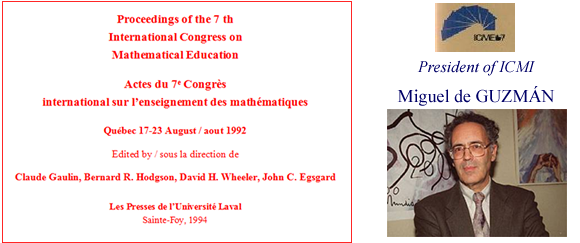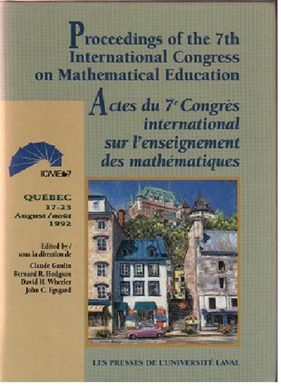 The website is in construction. New files will be uploaded as soon as they are available.
The website is in construction. New files will be uploaded as soon as they are available.
ICME-7
 |
Contents of the first Volume (Proceedings)
[the French/English translation is omitted]Preface p. XIII
Codes of countries p. XXI
Schedule p. XXIV
PRESIDENTIAL ADDRESS1
Plenary Lectures
Teachers of Mathematics - Geoffrey Howson p. 9
Bringing Mathematical Research to Life in the Schools - Maria M. Klawe p. 27
Enseigner la géométrie: permanences et révolutions - Colette Laborde p. 47
Fractals, the Computer, and Mathematics Education - Benoit B. Mandelbrot p. 77
Working Groups
WG 1: La formation de concepts mathématiques élémentaires au primaire (Helen Mansfield, AUS) p. 101
WG 2: Students' Misconceptions and Inconsistencies of Thought (Shlomo Vinner, ISR) p. 109
WG 3: Students' Difficulties in Calculus (Michèle Artigue, FRA) p. 114
WG 4: Theories of Learning Mathematics (Pearla Nesher, ISR) p. 120
WG 5: Improving Students' Attitudes and Motivation (Gilah Leder, AUS) p. 128
WG 6: Preservice and Inservice Teacher Education (John Dossey, USA) p. 134
WG 7: Language and Communication in the Mathematics Classroom (Heinz Steinbring) p. 139
WG 8: Innovative Assessment of Students in the Mathematics (Jùlianna Szendrei, HUN) p. 146
WG 9: [Not listed]
WG 10: Multicultural and Multilingual Classrooms (Patrick Scott, USA) p. 154
WG 11: The Role of Geometry in General Education (Rina Hershkowitz, ISR) p. 160
WG 12: Probability and Statistics for the Future Citizen (Mary Rouncefield, GBR) p. 168
WG 13: The Place of Algebra in Secondary and Tertiary Education (Carolyn Kieran, CAN) p. 174
WG 14: Mathematical Modelling in the Classroom (Trygve Breitag, NOR) p. 180
WG 15: Undergraduate Mathematics for Different Groups of Students (Daniel Alibert, FRA) p. 186
WG 16: The Impact of the Calculator on the Elementary School (Hilary Shuard †, GBR) p. 191
WG 17: Technology in the Service of the Mathematics Curriculum (Klaus-D. Graf, GER) p. 197
WG 18: Methods of Implementing Curriculum Change (Hugh Burkhard, GBR) p. 202
WG 19: Early School Leavers (Carlos Vasco, COL) p. 205
WG 20: Mathematics in Distance Learning (Gordon Knight, NZL) p. 211
WG 21: The Public Image of Mathematics and Mathematicians (Thomas Cooney, USA) p. 219
WG 22: Mathematics Education with Reduced Resources (Elfriede Wenzelburger †, MEX) p. 226
WG 23: Methodologies in Research in Mathematics Education (Norbert Knoche, GER) p. 230
Topic Groups
TG 1: Mathematical Competitions (Edward J. Barbeau) p. 239
TG 2: Ethnomathematics and Mathematics Education (Ubiratan D'Ambrosio, BRA) p. 242
TG 3: Mathematics for Work: Vocational Education (Rudolf Straesser, GER) p. 244
TG 4: Indigenous Peoples and Mathematics Education (Bill Barton, NZL) p. 247
TG 5: The Social Context of Mathematics Education (Alan J. Bishop) p. 250
TG 6: The Theory of Practice and Proof (Gila Hanna, CAN) p. 253
TG 7: Mathematical Games and Puzzles (Tibor Szentivanyi, HUN) p. 257
TG 8: Teaching Mathematics through Project Work (Jarkko Leino, FIN) p. 260
TG 9: Mathematics in the Context of the Total Curriculum (John Mack, AUS) p. 264
TG 10: Constructivist Interpretations of Teaching and Learning Mathematics (John A. Malone and Peter S. Taylor, AUS) p. 268
TG 11: Art and Mathematics (Rafael Pérez Gòmez, ESP) p. 272
TG 12: Graduate Programs and the Formation of Researchers in Mathematics Education (Hans-Georg Steiner, DEU) p. 274
TG 13: Television in the Mathematics Classroom (David Roseveare, GBR) p. 278
TG 14: Cooperation between Theory and Practice in Mathematics Education (Falk Seeger, DEU) p. 282
TG 15: Statistics in the School and College Curriculum (Richard Schaeffer, USA) p. 286
TG 16: The Philosophy of Mathematics Education (Paul Ernest, GBR) p. 289
TG 17: La documentation professionnelle des enseignants de mathématiques (Jeanne Bolon, FRA) p. 293
Study Groups
HPM: An Historical Perspective on Learning, Teaching and Using Mathematics p. 299
IOWME: Gender and Mathematics Education p. 304
PME: Report of Activities p. 310
ICMI Studies
S1: The Influence of Computers and Informatics on Mathematics and its Teaching p. 315
S2: The Popularization of Mathematics p. 319
S3: Assessment in Mathematics Education and its Effects p. 323
Miniconference on Calculators and Computers p. 331
Abstracts of Lectures p. 341-382
[contains the abstracts of the Selected Lectures of the second volume and the abstracts of the lectures by following authors: Philip J. Davis, Jean-Marc Deshouillers, Joaquin Giménez, Fred Goffree, Ronald L. Graham, Magdalene Lampert, Ronald Lancaster, Fernand Lemay, Charles Lovitt, , Seymour Papert, Nancy Shelley, Uri Treisman, Marion Walter]
Short Presentations and Round Tables p. 385
Projects and Workshops p. 389
Special Exhibitions and Math Trail p. 399
National Presentations p. 407
Special Sessions
Probe p. 413
Crossfire: Mathematical Competitions - Do the Benefits Outweigh the Disadvantages? p. 417
Awarding of Honorary Degrees to Jean-Pierre Kahane and Henry Pollak p. 421
Tribute to H.S.M. Coxeter p. 423
A Celebration in Memory of Caleb Gattegno p. 425
Films and Videos p. 429
Special Meetings p. 433
Secretary's Closing Remarks - Mogens Niss p. 437
Committees and Sponsors p. 451
List of Participants p. 463
Distribution by Country p. 494
Contents of the second Volume (Selected Lectures)

Preface p. IX
Contribution de l'apprentissage de la géométrie à la formation scientifique - Gérard Audibert p. 1
Diagnostic Teaching - Alan Bell p. 19
Reading, Writing and Mathematics: Rethinking - Raffaella Borasi and Marjorie Siegel p. 35
Teachers Using Videotapes as Reference Points - John L. Clark p. 49
The Transition to Secondary School Mathematics - David Clarke p. 59
Mathematicians and Mathematical Education - Michael P. Closs p. 77
Les mathématiques comme reflet d'une culture - Jean Dhombres p. 89
Imagery and Reasoning in Mathematics and Mathematics Education - Tommy Dreyfus p. 107
Interweaving Numbers, Shapes, Statistics, and the Real World in Primary School and Primary Teacher Education - Andrejs Dunkels p. 123
Teaching Mathematics and Problem Solving to Deaf and Hard-of-Hearing Students - Harvey Goodstein p. 137
The Origin and Evolution of Mathematical Theories- Miguel de Guzmàn p. 147
Le calcul infinitésimal - Bernard R. Hodgson p. 157
Computer-Based Microworlds: a Radical Vision or a Trojan Mouse? - Celia Hoyles p. 171
Different Ways of Knowing: Contrasting Styles of Argument in India and the West - George Gheverghese Joseph p. 183
Mathematics Education in the Global Village : the Wedge and the Filter - Murad Jurdak p. 199
Bonuses of Understanding Mathematical Understanding - Thomas E. Kieren p. 211
Curriculum Change: An American-Dutch Perspective - Jan de Lange p. 229
Training Teachers or Educating Professionals? What are the Issues and How Are They Being Resolved? - Glenda Lappan and Sarah Theule-Lubienski p. 249
What is Discrete Mathematics and How Should We Teach It? - Jacobus H. van Lint p. 263
Intuition and Logic in Mathematics - Michael Otte p. 271
Vers une construction réaliste des nombres rationnels - Nicolas Rouche p. 285
Mathematics is a Language - Fritz Schweiger p. 297
Mathematical Thinking and Reasoning for All Students - Moving from Rhetoric to Reality - Edward A. Silver p. 311
Humanistic and Utilitarian Aspects of Mathematics - Thomas Tymoczko p. 327
From "Mathematics for Some" to "Mathematics for All" - Zalman Usiskin p. 341
On the Appreciation of Theorems by Students and Teachers - Hans-Joachim Vollrath p. 353
Geometry as an Element of Culture - Alexandr D. Alexandrov p. 365
Notes
Attendance was about 3500 participants from 94 countries. The first and to the second volume have the same preface describing the structure that is becoming the norm for the ICME congresses (see Contents). In the Presidential Address, Miguel de Guzman stresses the need for a Solidarity Program and a Solidarity Fund in Mathematics Education. In his concluding address, the Secretary General Mogens Niss reminds the audience that the ICMEs are held on behalf of and under the auspices of ICMI. He gives a survey on the activities of ICMI and underlines the complexity of the field of mathematics education.
Two volumes, format about 23,5 cm x 15 cm; XXV + 495 + XII + 370 pages.
